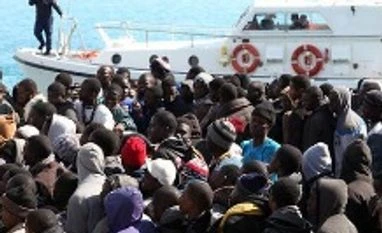More than 3,400 migrants were rescued at sea, mainly off Libya, as Europe seeks ways to deal with the flood of people trying to reach its shores following a series of deadly shipwrecks.
A total of 3,427 people were picked up during the operation co-ordinated by the Italian coast guard.
While they said it was a "very busy day", it was not a record for the coast guard, which coordinated the rescue of 3,791 migrants on April 12 and another 2,850 the following day.
The migrants -- all men -- had been on board three boats, the authorities said, adding that two suspected people smugglers were also caught and would be handed over to Italian police.
In Italy, the coast guard announced late at night that 16 vessels had rescued a total of 3,427 people on Saturday alone in an operation co-ordinated from their headquarters in Rome.
In addition to the French patrol boat, the rescue operation mobilised four Italian coast guard ships, two Italian navy vessels, two cargo ships, two Italian customs ships and two tugs.
Most notably, the navy said on Twitter that the frigate Bersagliere had rescued 778 migrants while the patrol boat Vega had picked up another 675.
Some of the rescued migrants were expected to arrive overnight on the Italian island of Lampedusa, the closest to the African coast, while most of the others are expected to arrive in Sicily or southern Italy on Sunday night.
According to the Italian coast guard, the French patrol vessel should land its migrants at a port in Calabria.
Hundreds of migrants, mostly African but also many Syrians escaping the war at home, land every day on the Italian coast after being rescued by the Italian navy or coast guard.
Following a series of shipwrecks which killed more than 1,200 people in April, European leaders at an extraordinary summit on April 23 agreed to strengthen the EU presence at sea in a bid to halt the tidal wave of refugees trying to reach Europe.
They decided to triple funding for the Triton operation, run by the Frontex border agency, which was previously three million euros ($3.4 million) a month.
Triton was launched in November 2014 to supplant the more ambitious Italian "Mare Nostrum" ("Our Sea") rescue operation launched a year earlier.
The EU is also seeking UN support to combat the smugglers who thrive on the chaotic situation in Libya.
A total of 3,427 people were picked up during the operation co-ordinated by the Italian coast guard.
While they said it was a "very busy day", it was not a record for the coast guard, which coordinated the rescue of 3,791 migrants on April 12 and another 2,850 the following day.
More From This Section
French patrol boat Commandant Birot, which was sent to boost EU patrols to deal with the influx of migrant boats in the Mediterranean, picked up 217 people off the coast of Libya.
The migrants -- all men -- had been on board three boats, the authorities said, adding that two suspected people smugglers were also caught and would be handed over to Italian police.
In Italy, the coast guard announced late at night that 16 vessels had rescued a total of 3,427 people on Saturday alone in an operation co-ordinated from their headquarters in Rome.
In addition to the French patrol boat, the rescue operation mobilised four Italian coast guard ships, two Italian navy vessels, two cargo ships, two Italian customs ships and two tugs.
Most notably, the navy said on Twitter that the frigate Bersagliere had rescued 778 migrants while the patrol boat Vega had picked up another 675.
Some of the rescued migrants were expected to arrive overnight on the Italian island of Lampedusa, the closest to the African coast, while most of the others are expected to arrive in Sicily or southern Italy on Sunday night.
According to the Italian coast guard, the French patrol vessel should land its migrants at a port in Calabria.
Hundreds of migrants, mostly African but also many Syrians escaping the war at home, land every day on the Italian coast after being rescued by the Italian navy or coast guard.
Following a series of shipwrecks which killed more than 1,200 people in April, European leaders at an extraordinary summit on April 23 agreed to strengthen the EU presence at sea in a bid to halt the tidal wave of refugees trying to reach Europe.
They decided to triple funding for the Triton operation, run by the Frontex border agency, which was previously three million euros ($3.4 million) a month.
Triton was launched in November 2014 to supplant the more ambitious Italian "Mare Nostrum" ("Our Sea") rescue operation launched a year earlier.
The EU is also seeking UN support to combat the smugglers who thrive on the chaotic situation in Libya.
)